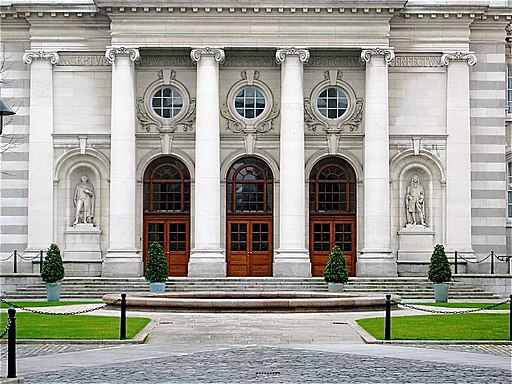
Recently a senior and experienced political activist in one of the major parties in government remarked to me that he feared that this could well turn out to be the worst partnership period for those two parties.
You might think that with ideological differences no wider than a cigarette paper dividing them and a clear run of up to five years in office virtually guaranteed, they have nothing holding them back from taking the radical political steps to address the issues facing Ireland. And yet I share his apprehensions.
For one thing, I think that it was a mistake to provide this time for a rotating Taoiseach. I do not believe that taking turns at senior government roles is helpful in any way. Micheál Martin is, I think, a perfectly competent and experienced Taoiseach. I don’t see that limiting his term to three years serves any useful purpose – apart, that is, from giving Simon Harris a go at the wheel in the run up to the next election.
Ministers hardly have their feet under the desk before they are preparing to depart from office. Having served a five-year term, I know just how transient that period can be. Civil servants have a certain relationship with ministers. When ministers hold office with an early sell-by date label on their foreheads, that relationship changes. Rotating senior government positions looks increasingly like a cynical political game rather than serving the national interest.
The Government faces many pressing issues – the three “known knowns” of home-building, the infrastructure deficit, and immigration policy. It also faces the “known unknowns” including the possibility of global trade war, European security issues, and international climate change goals in the era of Trump and possibly Vance.
Take the area of housing. A new minister, James Browne, a competent and intelligent politician, has been given ministerial responsibility for this national policy. Is he being given five years at the helm? The job needs that term at the very least.
There are really huge policy decisions to be made. Increasing supply of building land and associated infrastructure, pro-active planning laws, realistic building standards, faster decision making, use of compulsory purchase, creation of urban developments agencies with real power to tackle dereliction and under-development, and many others, all need a “rolled-up sleeves”, hands-on minister backed by the entirety of government.
I have to say that I found it grossly dispiriting to witness an emerging public party wrangle between Fianna Fáil and Fine Gael on whether tax policy should or should not be used to develop the available necessary capital for projects that will take at least two years after confirmation to commence building. The fact that the two parties are already in dispute on that matter bodes ill for their term in office. They should put their manifestos aside and cooperate on a pragmatic basis for the next five years on housing.
Of course, tax incentives should be deployable as one, but by no means the only, way of getting capital into home-building. But the other major issues mentioned above must be addressed urgently as well. Public capital simply will not, by itself, address the issue.
The latest children’s hospital news is as clear a sign of what problems are posed by reliance on public financing. And if you think that that project was a cause for worry, brace yourself for the ten to twenty billion Metrolink project planned instead of the alternative, a major surface Luas network using very light rail technology for the entire city in seven to ten years.
We hear ministerial speeches about how social housing provision is approaching its highest level for fifty years. Beware! The sad implication is that we were providing the same volume of social housing fifty years ago with a poorer economy and much smaller population. Also, we must remember that a considerable amount of Dublin City Council’s social housing output is being carried out by demolishing its own existing social housing estate across the city.
Storm Eowyn and Storm Darragh demonstrated how weak our power networks have become. Energy infrastructure needs investment to meet known risks and demand growth. We have the financial resources to build out the national motorway and dual carriageway network in the south-west, the west, and the northwest (including Sligo and the Derry/ Letterkenny cross-border road project.
Last, and not least, the Government has to confront our failed immigration and asylum system. Things cannot go on as they are. Housing, health, education, childcare and welfare require effective controls on migration. The EU migration pact is no solution to the problem. As long as the Charter of Fundamental Rights enshrines as EU law the failed and unsustainable Geneva Convention on refugees, the crisis will continue. That must change. It’s not a matter for Jim O’Callaghan alone. It is the urgent business of Iveagh House, Minister Harris, and the whole of government.
